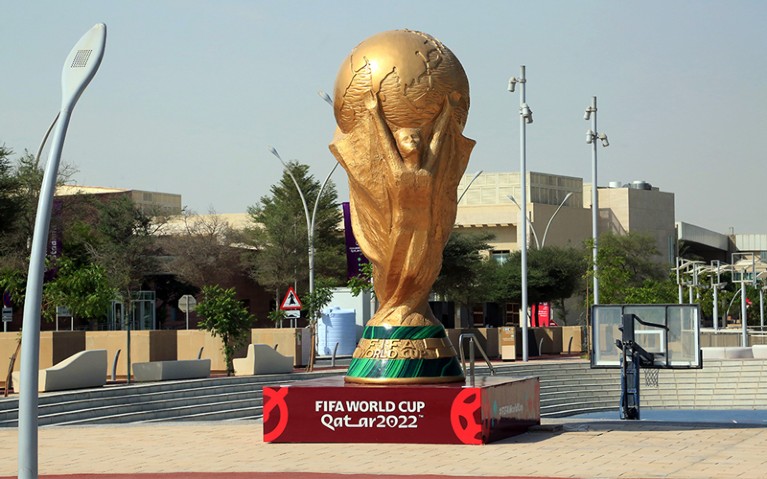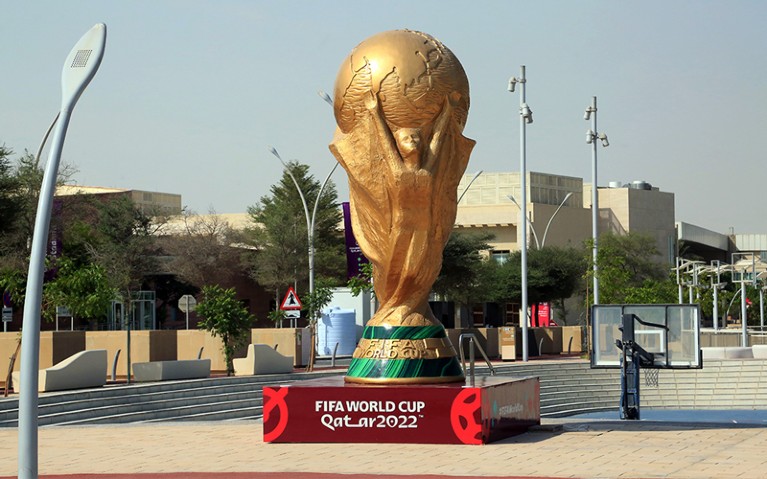
A replica of the FIFA World Cup trophy at Education City, Qatar’s multibillion-dollar science and education campus.Credit: Sidhik Keerantakath/Eyepix Group/Future Publishing/Getty
The FIFA men’s World Cup in Qatar will bring not only an influx of football fans to the country, but also heightened awareness of its developing science programme. “It cannot be a better time for Qatar to advertise itself on the international stage as a producer of knowledge and science,” says Susu Zughaier, a microbiologist and immunologist at Qatar University on the outskirts of Doha.
Over the past two decades, Qatar — a nation about the size of the US state of Connecticut, with a population of 2.9 million people — has been turning itself into a leading centre for education and research. “Qatar is a really small place with big ambitions,” says Robert Mogielnicki, a political economist at the Arab Gulf States Institute in Washington DC. “They have a tremendous amount of financial resources to help them achieve various strategies and development initiatives.”
One of those initiatives is Education City, a 12-square-kilometre campus in Al Rayyan, Qatar’s third-largest municipality. Education City was developed by the Qatar Foundation, a state-led non-profit group for education, science and community development. Its price tag has not been made public, but it reportedly ran into the “few billion dollars”, according to comments made in 2015 by former Qatar Foundation president Mohammad Fathy Saoud to the US newspaper The Washington Post.
Education City, which is also the location of one of the World Cup stadiums, features state-of-the-art buildings and laboratories hosting satellite branches of seven foreign universities, six of which are in the United States, including Georgetown University in Washington DC and Northwestern University in Evanston, Illinois. Some of these labs made major contributions during the pandemic; others are now poised to make waves in technology, genomics and medicine.
“The infrastructure and resources that are there are really very world class,” says Hilal Lashuel, a Yemeni-born neuroscientist at the Swiss Federal Institute of Technology Lausanne’s Brain Mind Institute in Switzerland, and the former executive director of the Qatar Biomedical Research Institute in Education City.
Education City is also just a 25-minute drive from Qatar University, the nation’s largest and oldest higher-education institution, established in the 1970s, which houses its own cutting-edge labs and teaching facilities across its striking campus of interconnected octagonal and cubic buildings.
Human-rights controversies
Qatar’s scientific advancements are marred, however, by the country’s human-rights record, including its treatment of foreign workers who were hired to undertake some of the US$220 billion in preparations for the World Cup. Qatar also maintains repressive laws and cultural norms pertaining to sex and gender: extramarital sex is illegal and punishable with up to seven years in prison, and same-sex sexual activity is criminalized with the same maximum jail sentence, although the extent to which such laws are enforced is unclear. It is also technically possible, under Sharia law, for a penalty of death by stoning to be imposed for sexual activity between men. LGBT+ rights are nonexistent, and lesbian, gay, bisexual and transgender Qataris have been subjected to beatings and harassment in police custody as recently as September 2022, according to Human Rights Watch, an international non-governmental organization based in New York City.

Collection: Diversity and scientific careers
Tamim bin Hamad Al Thani, the emir of Qatar, has said that LGBT+ tourists who come to see the World Cup will be welcomed but are expected to “respect our culture”. Human-rights advocates say this does little to help the country’s LGBT+ people, however, or the foreign students and scientists who are considering relocating there.
Drawing scientific talent to build up a critical mass of researchers is essential for Qatar if it wants to realize its vision of becoming a global centre for science. Recruitment was not difficult during Lashuel’s time as director of one of Qatar’s major research institutes, and the country remains an attractive option for scientists in the United States who are facing funding challenges, he says. Although he is not aware of any specific Qatari programmes designed to lure talent from abroad, he says that a number of funding initiatives run by the Qatar National Research Fund, based in Doha, and local universities are targeted at collaborative projects with international scientists and institutions. Qatar has also started to grant permanent-resident status to select groups of overseas scientists this year, he says.
Some expat Middle Eastern scientists who were educated or were working in the West have welcomed the chance to come back to the region, including Zughaier. She came to Qatar by way of the United States, where she was naturalized after emigrating from the Palestinian territories. In 2017, after spending 17 years conducting research at Harvard University in Cambridge, Massachusetts, and Emory University in Atlanta, Georgia, she accepted an offer at Qatar University. Funding constraints and the political environment in the United States contributed to her decision to leave, she says, but equally important was what Qatar had to offer. “I saw the calibre of scientists they recruited at different institutions, and the capabilities they have,” she says.
Professional interest in Qatar has increased since Zughaier relocated her lab there five years ago. Scientists in Qatar made headlines during the pandemic, for example, with major contributions to COVID-19 research, including on vaccine efficacy. Qatar’s Nature Index Share, a fractional count of author affiliations among publications in 82 high-quality natural-science journals, also rose to 13.78 in 2021, from 7.99 in 2020. “The amount of research we’re producing is really competing with top intuitions,” Zughaier says.
The World Cup has also drawn attention to the small nation’s outsized science programme. At an American Society for Microbiology conference held in Washington DC in June, several people stopped at Zughaier’s poster not just to inquire about her research, she says, but to ask, “Are you ready for the World Cup?”
“The World Cup contributes to the sense that there are exciting things going on in Qatar both on an entertainment and professional level,” Mogielnicki says. “It’s helping to put Qatar on the map.”
Pressure needed
The World Cup has also highlighted more troubling aspects of life in Qatar, including poor working conditions at construction sites. One analysis suggested that more than 6,500 migrant workers from India, Pakistan, Nepal, Bangladesh and Sri Lanka have died in Qatar since 2010, when it won the right to host the World Cup. Mogielnicki hopes that the global attention brought by the tournament will lead to “continued pressure” to make sure that migrant workers receive better treatment in future.
So far, both the Qatari government and FIFA, football’s governing body and organizer of the World Cup, are “just not engaging” on the issues with the country’s repressive laws and discrimination against LGBT+ people, says Nasser Mohamed, a Qatari physician in San Francisco, California, and founder of the Alwan Foundation, a non-profit group that gathers data on LGBT+ communities in Gulf countries. Neither the government nor FIFA have responded to a petition that Mohamed launched in June for Qatar to repeal discriminatory legislation and ensure LGBT+ rights, he says. Mohamed adds that the Instagram account of former England footballer David Beckham, an ambassador for the World Cup in Qatar, blocked him after he tried to highlight the state’s discriminatory laws, although Mohamed’s account was later unblocked.
Qatar’s treatment of LGBT+ people pushes native talent out of the country and discourages some foreign talent from relocating there, says Mohamed. He points to himself as an example.
Mohamed sought asylum in the United States in 2011, a decision that was primarily motivated by the fact that he is gay. “Who I am was just not compatible with where I was born,” he says. “I truly thought I was not safe and I would suffer completely if I stayed.”
In May, Mohamed publicly came out about his sexuality in an article by BBC News. This event has been reported as being the first time a Qatari has ever publicly identified as gay. His plan, he says, was to harness the attention being generated by the World Cup to raise awareness about the plight of LGBT+ people in his home country and to try to effect positive change. He’s received death threats since then, but has heard from many LGBT+ people who have fled Qatar, as well as some who still live there in hiding.
LGBT+ people lack basic protections in Qatar against violence and discrimination, Mohamad says, so for any LGBT+ scientists or students thinking about visiting or relocating there, “you’re going to have to choose your career over who you are”.
One thing that is “extremely important”, adds Alfredo Carpineti, an astrophysicist, science journalist and chair of Pride in STEM, a UK-based charity, is for organizations that collaborate with Qatar — including universities, professional societies and companies — to provide a clear set of guidelines for LGBT+ people about how they should approach working in or with the country, and what kind of support they can expect from their host university or company. “Of the organizations collaborating with Qatar on this big Education City, it would be interesting to see what kind of rules, if any, are put down to support LGBT+ individuals that might go there,” Carpeneti says.
Some of the universities that have set up branch campuses in Qatar have received criticism in the past over the Gulf state’s human-rights issues. In 2020, Northwestern University was criticized for cancelling an event at its Doha campus that would have featured a band whose lead performer is openly gay.
Representatives of several US university branches in Qatar — including Texas A&M University in College Station, Carnegie Mellon University in Pittsburgh, Pennsylvania, Georgetown University and Northwestern University — did not respond to interview requests from Nature about how human-rights concerns affect academic interest in Qatar, and what steps they are taking to ensure their LGBT+ students and faculty are protected. The Qatar Foundation responded to an interview request but did not meet it in time for publication.
“At the end of the day, fans will go back home,” Carpineti says. “I’ve seen very little discussion that actually focuses on the LGBT+ people in Qatar.”








